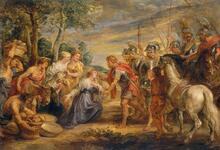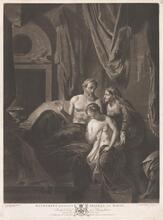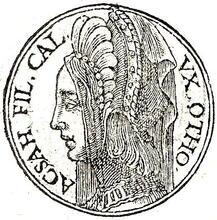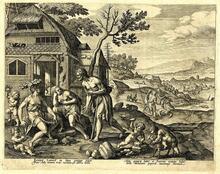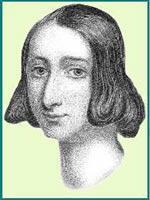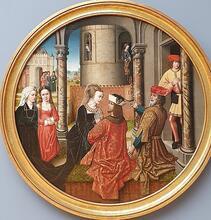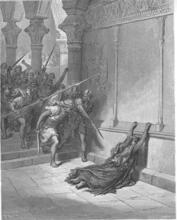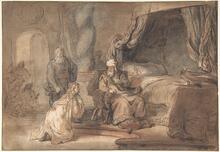Rizpah: Midrash and Aggadah
Rizpah features prominently in the narrative of Saul’s death at the hands of the Gibeonites, and her behavior during the episode of the Gibeonites is highly praised by the Rabbis. Although two of her sons died, she accepted this and took care that their corpses not be despoiled. Her actions were considered worthy of emulation, and even King David learned from her. Rizpah’s deeds helped save all Israel from the famine.
Marriage
The A type of non-halakhic literary activitiy of the Rabbis for interpreting non-legal material according to special principles of interpretation (hermeneutical rules).midrash relates that after the death of Saul, David married Rizpah daughter of Aiah, who, according to the Bible, had been the dead king’s concubine. The Rabbis learn this from Nathan’s words to David in II Sam. 12:8: “I gave you your master’s house and possession of your master’s wives,” with “your master’s wives” alluding to Rizpah. Although for appearance’s sake a man may not marry his father-in-law’s wife, David married Rizpah after Saul’s death, since the king’s widow may marry only another monarch (JT Yevamot 2:4, 3d; JT Sanhedrin 2:3, 20b).
Saul and the Gibeonites
II Sam. 21:1–14 chronicles a severe famine in The Land of IsraelErez Israel that lasted for three consecutive years. In the Rabbinic account, in the first year David asked the Israelites: Perhaps there are idolaters among you, and this sin is the cause of the withholding of the rains? They searched, but did not find [the practice of idolatry]. In the second year, David asked the Israelites: Perhaps there are transgressors among you, and this sin is the cause of the withholding of the rains? They searched, but found nobody. In the third year, David asked the Israelites: Perhaps there are men among you who make it known publicly that they give charity, while in truth they do not do so, and this sin is the cause of the withholding of the rains? They searched, but did not find anyone. David said: This matter [the withholding of the rains] is dependent on me [i.e., it has happened because of me].
David immediately consulted the Urim and Thummim. The Lord’s response is recorded in verse 1: “It is because of the bloodguilt of Saul and [his] house, for he put some Gibeonites to death.” The Rabbis list two reasons for the famine. One was because the Israelites did not properly eulogize Saul, while the other was Saul’s killing of some Gibeonites. Regarding the eulogy, David said: More than twelve months, which is the usual mourning period, have already passed, and it is not the practice to eulogize after such a long time.
As for the Gibeonites, he summoned them to effect a reconciliation. He sought to appease them, but they would not be placated until seven of Saul’s sons, including Rizpah’s two sons, were handed over to them. How did David choose them? He had Saul’s sons pass before the Ark; whoever adhered to the Ark and could not move, was chosen to die, while those who passed by it were chosen to live (BT Yevamot 78b–79a).
Saul’s Corpse
II Sam. 21:9 relates that the seven were put to death “in the first days of the harvest”; according to the midrash, this was on the sixteenth of Nisan, the day on which the Omer (the first sheaves of barley—see Lev. 23:10–14) was offered. The Rabbis relate that Rizpah was not angry at God; to the contrary, she justified His actions and recited the verse (Deut. 32:4): “The Rock! His deeds are perfect, yea, all His ways are just; a faithful God, never false, true and upright is He.” For seven months Rizpah guarded the corpses—during the day from the birds of the sky, and at night, from the wild beasts.
Although God told David to bury Saul and eulogize him, David shirked this responsibility. When he saw Rizpah’s actions, he derived a kal ve-homer (an a minori ad majus inference) about himself, and said: This woman has acted with loving kindness; should not I, the king, certainly do so? He immediately went to perform this last kindness for Saul, who had been buried outside Erez Israel and had not been properly eulogized. David assembled all the elders of Israel and their illustrious ones and they crossed the Jordan River. They came to Jabesh-gilead, where they found the bones of Saul and his son Jonathan, placed them in a coffin and recrossed the Jordan.
David ordered Saul’s coffin to be conveyed through all the tribes of Israel. When his coffin arrived, everyone would go forth, men, women, and children, and they would pay their respects to Saul and his son, until the coffin came to Saul’s estate near Jerusalem, where they buried him. Thus, Rizpah’s actions caused David and all the people of Israel to fulfill their duty of honoring the dead.
Rizpah’s Sons
When God saw that David and all Israel had shown this last kindness to Saul, and that they had also atoned for their sin against the Gibeonites, He was instantly filled with compassion and sent down rain upon the earth, as it is said in II Sam. 21:14: “After that, God responded to the plea of the land” (Num. Rabbah 8:4).
When the non-Jewish peoples saw Rizpah’s sons, they declared: “The Torah she-bi-khetav: Lit. "the written Torah." The Bible; the Pentateuch; Tanakh (the Pentateuch, Prophets and Hagiographia)Torah of Israel is false! For it is written in Deut. 21:23, ‘You must not let his corpse remain on the stake overnight,’ but these remained hanging for seven months. It is written that two are not to be judged on the same day, while seven were killed together. It is written in Deut. 24:16, ‘Parents shall not be put to death for children, nor children be put to death for parents,’ but these sons died for the iniquity of their father Saul. What was the sin of these, that they should be treated differently?”
The Israelites replied: “Their fathers harmed the Gibeonites, who were converts.” They asked: “What was the nature of these converts?” They [the Israelites] answered: “They were self-made converts [gerim gerurim], who deceitfully converted during the time of Joshua, and were hangers-on [nigrarim] after Israel.” They [the non-Jewish peoples] said: “If because of these self-made converts God does so to His people, who are the sons of kings, how much more so for ordinary people.” Look how God exacted punishment for the shedding of the blood of those who had not converted for the sake of Heaven and had deceived Israel; God undoubtedly will accept and raise up those who convert for the sake of Heaven, out of love. Surely, there is no god like their God, and there is no nation like their nation. We must adhere to this nation, whose God is greater than all gods. Many of the peoples immediately converted.
The Rabbis learned from this episode that the sanctification of the Name of God through the sons of Rizpah outweighed the desecration of the Name for which they were responsible. Although the Name of God was desecrated by their death, since a number of laws were violated, the Name was nonetheless greatly sanctified through them, for many consequently converted (Num. Rabbah 8:4). The Rabbis said of this that it is better that a letter of the Torah be uprooted [i.e., that an explicit law of the Torah be violated] so that the Name of God will be publicly aggrandized (BT Yevamot 79a).

